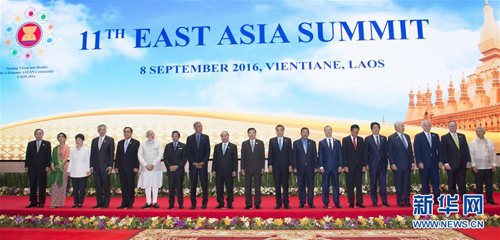|

At noon of September 8, 2016 local time, Premier Li Keqiang attended the 11th East Asia Summit (EAS) at the National Convention Center in Vientiane. Leaders from the ten ASEAN members, President Park Geun-hye of the ROK, President Barack Obama of the US, Prime Minister Dmitry Medvedev of Russia, Prime Minister Shinzo Abe of Japan, Prime Minister Narenda Modi of India, Prime Minister Malcolm Turnbull of Australia, Prime Minister John Key of New Zealand and UN Secretary General Ban Ki-moon were present. Prime Minister Thongloun Sisoulith of Laos chaired the summit.
In his speech, Li Keqiang said that since the founding of the EAS, it has made positive contributions to advancing understanding and mutual trust among all parties and promoting regional peace, stability, development and prosperity. Although today's world faces multiple challenges, East Asia is still a "pure land" far away from wars and conflicts and a bonanza for trade and investment. All parties should follow cooperation experience, grasp the right direction, stick to the nature of EAS as a "leaders-led strategic forum", support the ASEAN's centrality, pursue the "ASEAN Way" of agreement through consultation and accommodating the comfort level of all parties, and promote dialogue and cooperation in an active and practical manner. On economic development, all parties should render strong support to regional connectivity, step up construction of free trade areas, and strengthen cooperation in social undertakings and people's livelihood. On political security, China sticks to its diplomatic tradition of equal treatment between big and small countries, mutual respect, seeking common ground while shelving differences and peaceful coexistence, advocates the new security concept which is common, comprehensive, cooperative and sustainable and supports all parties to strengthen cooperation on non-traditional security, discuss the building of a regional security architecture and properly settle hotspot and sensitive issues.
Li Keqiang pointed out that the East Asian region faces both great opportunities and multiple challenges in terms of peace, stability and prosperity. China is ready to work together with other countries to turn challenges into opportunities, and steadily push forward East Asia cooperation so as to contribute to regional peace, stability and lasting prosperity and deliver benefits to people of all countries.
Li Keqiang expounded China's principles and stance on the South China Sea issue.
First, as one of the signatories of the United Nations Convention on the Law of the Sea (UNCLOS), China has always been faithfully carrying out the UNCLOS. According to the UNCLOS, signatories have firsthand rights to solve disputes peacefully through direct dialogue and consultation. China's non-acceptance of and non-participation in arbitration and other third-party settlement procedures are rights endowed by the international law and the UNCLOS. Some countries present here have also adopted similar stance. Second, peace and stability in the South China Sea over the past ten-plus years was based on the Declaration on the Conduct of Parties in the South China Sea (DOC) agreed by China and the ASEAN. The DOC was formulated in accordance with the principles and spirit of international laws including the UNCLOS and has become an effective regional rule. As for the freedom of navigation and overflight in the South China Sea, it has never been an issue. As is stipulated in the DOC, relevant disputes in the South China Sea should be settled peacefully by parties directly concerned through negotiation and consultation, which is an effective approach in line with the international law. Unilaterally filed arbitration and bringing in a third party, which go against the DOC, could only make things more complex and thus undermine the rule-based regional order as well as regional peace and stability. Third, China is actively advancing negotiations on the Code of Conduct in the South China Sea (COC) with ASEAN countries in order to manage and control differences, dissolve conflicts and promote cooperation before the final settlement of disputes. At yesterday's China-ASEAN Summit, two outcome documents on maritime cooperation were adopted. China and ASEAN nations are wise enough and fully capable of dealing with the South China Sea issue. Countries outside the region should understand and support the positive efforts made by countries within the region, rather than overstating the differences, expanding them or even sowing discord.
Li Keqiang stressed that China always bears in mind the general picture of safeguarding regional peace and stability and handles the South China Sea issue in a constructive and responsible way. China stands ready to make concerted efforts with all parties to build the South China Sea into a sea of peace, cooperation and friendship that can benefit all peoples in regional countries.
Present leaders highly recognized the important role of the EAS in reinforcing regional peace and development and its cooperation outcomes. They noted that East Asia is the most dynamic region in the world and the engine for economic growth. The summit should adhere to the nature as a "leaders-led strategic forum", enhance political mutual trust, build a security architecture in line with East Asian features, effectively address challenges including nuclear proliferation, climate change, global development, refugee issues, natural disasters and terrorism and safeguard stability in East Asia. All parties should strengthen economic partnership, deepen the process of economic integration and step up practical cooperation in connectivity, finance, environmental protection, education, livelihood and other fields. All parties welcome the announcement of the China-ASEAN Summit that the COC will be reached as soon as possible and the adoption of outcome documents related to maritime cooperation. They also support all sides to comprehensively implement the DOC and resolve maritime disputes through peaceful and diplomatic measures so as to ensure stability and prosperity in the region.
After the summit, Li Keqiang attended the issuing ceremony of the Joint Leaders' Statement on the Regional Comprehensive Economic Partnership, together with leaders from the ten ASEAN members, the ROK, Japan, India, Australia, New Zealand and other countries.

|